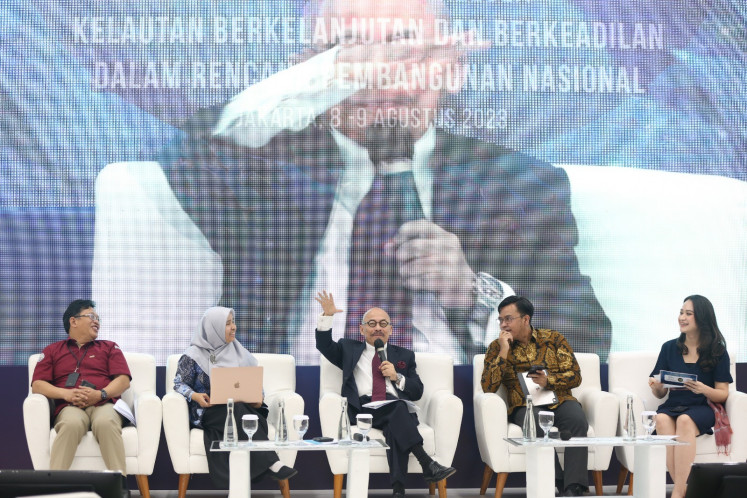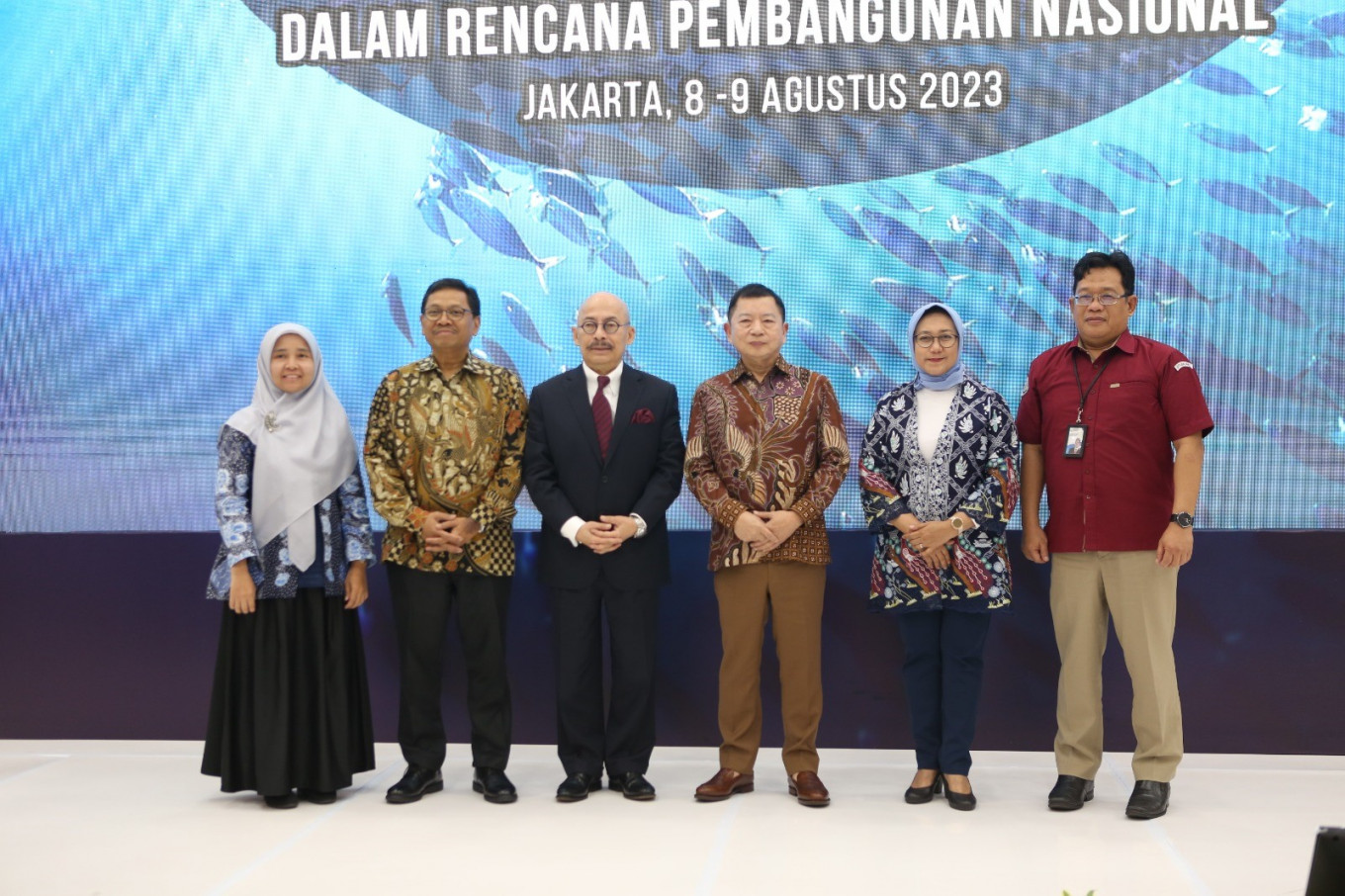Popular Reads
Top Results
Can't find what you're looking for?
View all search resultsPopular Reads
Top Results
Can't find what you're looking for?
View all search resultsIncorporating Blue Economy and Ocean Justice into the National Development Plans
Indonesia is the biggest archipelago in the world, home to more than 18,000 islands, and has the second-longest coastline in the world, second only to Canada
Change text size
Gift Premium Articles
to Anyone
I
ndonesia is the biggest archipelago in the world, home to more than 18,000 islands, and has the second-longest coastline in the world, second only to Canada. With the large body of water that the country controls, the blue economy is a sector that should not be overlooked.
In order to achieve the country’s development target, outlined in the National Long Term Development Plan (RPJPN) 2005-2025, the National Development Planning Agency (Bappenas) has added the mandate of the Blue Economy Development Framework to focus on the sector’s potential.
The new framework also supports global initiatives in achieving the 2030 Agenda on Sustainable Development Goals and is estimated to contribute around US$256 billion to the country’s total annual gross value in just five years.
The Indonesian Ocean Justice Initiative (IOJI), in collaboration with Bappenas and the Coordinating Ministry for Maritime Affairs and Investment, held a two-day seminar, starting on Tuesday (8/08), to discuss the potential for strengthening the sustainability and equity aspects in the maritime sector as contained in the RPJPN and National Medium-Term Development Plan (RPJMN) documents.
Titled “Strengthening Sustainable and Equitable Ocean Governance in the National Development Plans”, the first event was attended by stakeholders from government agencies, both local and foreign, along with organizations, educational institutions and private companies.
“[Indonesia’s first president] Bung Karno said Indonesia was a maritime country, and the islands should not be separated. So our state of mind must be different. Don't look at the islands as separated by oceans, [but rather that] we have a wide ocean and, in it, there are islands. Optimizing the blue economy is part of economic transformation, a means of finding new sources of economic growth,” said Suharso Monoarfa, Bappenas minister, during his keynote speech.
While he revealed that maritime development was a priority in the future, the minister also warned of obstacles that were faced in that development, namely climate change, sea pollution, triple planetary crises, overfishing and more.
Bappenas has said it is confident that the sea economy could contribute as much as 15 percent to the GDP if properly regulated. It currently accounts for only 7 percent, which means that there is a lot of untapped potential in the sector.
Dr. Vivi Yulaswati, MSc, the Deputy of Maritime Affairs and Natural Resources at Bappenas, gave a background of the marine economy in Indonesia, calling for multinational and local cooperation.
She said there are three strategies being implemented to increase the development of the sector in Indonesia. The first is changing perspectives on the maritime sector so that everyone understands the potential of the blue economy in Indonesia, which would maximize sustainability, followed by the realization that the ocean is a source of prosperity and well-being for all, and lastly to create efficient maritime regulation.
She added that for the country to be able to reach its Golden Indonesia vision by 2045, the national development plan has to be in parallel with the transformation of the blue economy, and more people should realize that the blue economy could be a solution as long as there is a cultural and structural transformation.
Those who attended also saw a panel discussion between experts in the field on a number of issues. Muhammad Yusuf, S.Hut., M.Sc., director of coastal and small island empowerment at the Ministry of Maritime Affairs and Fisheries, focused on increasing the welfare of ocean-dependent people. His presentation was then followed by that of Dr. Eva Anggraeni, director of global connectivity at IPB University, who presented obstacles to implementation.
“[blue economy development must be] science-based. This is an important factor that we have to hold on to. Then, we must develop based on the local context, and participation must be encouraged.” Dr. Eva said.
The panel discussion also included a presentation about the National Blue Agenda Actions Partnership (NBAAP) to support the RPJPN and RPJMN targets by Mochammad Firman Hidayat, S.E., MA., acting deputy for coordination of maritime resources at the Office of the Coordinating Maritime Affairs and Investment Minister.
"To promote sustainable development in a blue economy, it is very important to strengthen countries' capacities in sustainable management, utilization and innovation of ocean-based resources through science, technology and digital transformation as stated in the National Blue Agenda Actions Partnership (NBAAP). Through the Blue Innovation task force, NBAAP increases capacity, promotes innovation and ensures gender inclusivity in ocean-based industries, with a focus on livelihoods, employment, education and equitable participation for all stakeholders to sustain the requirements of blue economy development," he said.

Lastly, attendees were also given another presentation that focused on “Blue Justice in the Blue Economy” by
Dr. Mas Achmad Santosa, S.H., LL.M. He highlighted that there were as many as ten social injustices that might arise if the economy did not pay attention to blue/ocean justice, which were then grouped into three main categories.
The first is related to rights to the ecosystem and the utilization of marine resources. The second involved access to the distribution of benefits, especially for marginalized groups, including women and indigenous peoples. Third was access to full community participation, which often manifests in a lack of community involvement during strategic and governance decision-making processes.
"RPJPN 2025-2045 and RPJMN 2025-2029 need to provide a definition of the blue economy concept that adopts the concept of strong sustainability by prioritizing the concept of blue justice. The targets in the RPJMN also need to reflect the three main principles of a sustainable ocean economy, namely effective protection, sustainable use, and equitable prosperity," concluded IOJI CEO Mas Achmad Santosa
This article was published in collaboration with IOJI, Ministry of National Development Planning/Bappenas, and Coordinating Ministry of Maritime Affairs and Investment











